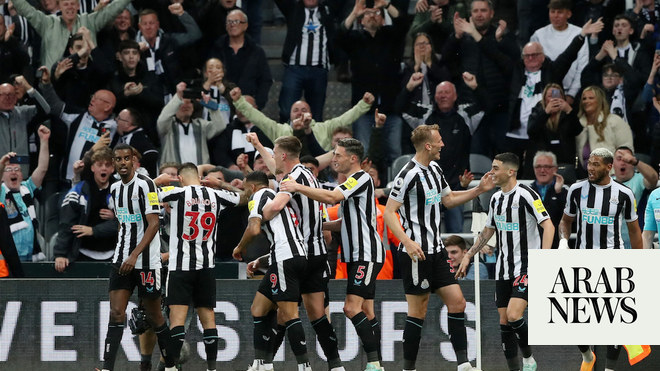
Football, no longer merely the national game, is England’s political theatre. The way in which the spasm of fan protest stopped the European Super League in its tracks in April, and which the prime minister erroneously claimed as his own victory, spoke to both a residual – if often dormant – public sense of justice and communitarianism, and the shamelessness of our snake-skinned political conversation. The open conflict between the England men’s team, the Conservative government and a section of the England fanbase over taking the knee at Euro 2020 was a battle over who gets to define the terms of our debate over structural racism. Now, the long anticipated sale of Newcastle United to Saudi Arabia’s sovereign wealth fund points to England’s practically and morally diminished place in the world, and the roads that have taken us there.
The crown prince of Saudi Arabia is not the first politician to take an interest in Newcastle United. In the early 1990s, Tony Blair, then leader of the opposition, was busy burnishing his local credentials by declaring his fidelity to the team, decrying Andy Cole’s transfer to Manchester United in the Sun, and playing keepy-uppy with Kevin Keegan. Like Blair, Newcastle United were the coming thing. After four decades without a trophy, but now under the new ownership of Sir John Hall, both a Thatcherite property developer and an advocate for regional government and regeneration in the north-east, Keegan’s Newcastle were challenging for the Premiership title and playing fabulous football to raging full houses. In 1996 Alan Shearer arrived, on a then record transfer fee, and declared to a delirious crowd that he was still “the son of a sheet-metal worker”. One could have been forgiven for thinking that, after the hammer blows of 17 years of Thatcherism, there was hope for an English working class and regional revival.
As we know, things did not turn out quite as planned. Keegan and his team imploded. New Labour took power but delivered neither meaningful devolution nor a model of regeneration that could sustainably revive the city. Hall’s investments in the club turned out to have been loans, some paid back at wincingly high interest rates. The Hall and Shepherd families (Freddy Shepherd succeeded Hall as chairman in 1997), showing extraordinary contempt for the club’s fans, presided over decline and then sold up to Mike Ashley, banking a couple of hundred million.
Whatever the Ashley regime’s failings, and there were many, the wider structural transformations of English football made any real revival of the club almost impossible. Unable to secure a regular place in European competition, or to establish themselves as a global brand, Newcastle were losing ground every season to the teams of London, Manchester and Liverpool. More significantly, Ashley actually tried to run the club like a business, and sells it on as a profit-making, if forlorn institution. But in the absence of collective wage controls, and with the arrival of other owners who had neither need nor interest in balanced books – like Roman Abramovich at Chelsea and the UAE at Manchester City – it was a strategy doomed to mediocrity, at best.
Little wonder, then, that most of Newcastle is delighted that they now have their own oligarchs to play with. Having been failed, as a city and a club, by the tepid reforms of New Labour’s regeneration programme, the rentier economics of local property developers and the low-wage, sweatshop capitalism of 21st-century retail billionaires, why wouldn’t you opt for foreign oligarchs and their fossil fuel investment funds? It’s precisely what a significant slice of the country’s elites have been doing for years.
There is an entire industry, overwhelmingly in London and the south-east, that has grown grotesquely wealthy on servicing the political and economic needs of the Gulf’s ruling families, and oligarchs and dynasties everywhere. From the banks that launder stolen money, to the accountants that then hide it; from the lawyers who resolve tricky domestic affairs to the PR firms mopping up the damage afterwards, and the estate agents that arrange to store your wealth in London’s empty residential skyscrapers. Our governments and arms industry have been hardly any better, barely able to censure the Saudi state for its human rights abuses, the murder of Jamal Khashoggi or its war in Yemen for fear of losing enormous arms sales and construction contracts. And yet now Newcastle United’s fans are meant to lead the fight for human rights?
There is another footballing world in which these kinds of odious compromises and contradictions could be lessened. The distribution of money within the Premier League and football more widely could have been more egalitarian. Systems of regulation and control could have put a break on the arms race of spending and the concentration of capital and footballing success. It would have been a world in which Newcastle’s phenomenally loyal support would have been an economic advantage rather than an irrelevance.
A properly regulated football would have drawn the line at Abramovich as an owner, let alone permit exiled prime ministers from around the world and the sovereign funds of authoritarian states to buy clubs. In fact, Newcastle United, and every other team, could have been passed into German-style social ownership.
However, at every turn, as with our wider economy and society, we have allowed the private to trump the public. We nurture and tolerate eye-watering levels of inequality, poverty and downward social mobility, and have long since made our peace with the power of capital, whatever its origins and actions. How many times do we have to learn the lesson that, if you continually deny people hope that this can change for the better, they will gravitate to those offering something different, however pernicious their real intentions, however false their prospectus?
David Goldblatt is the author of The Ball is Round: A Global History of Football and The Game of Our Lives












